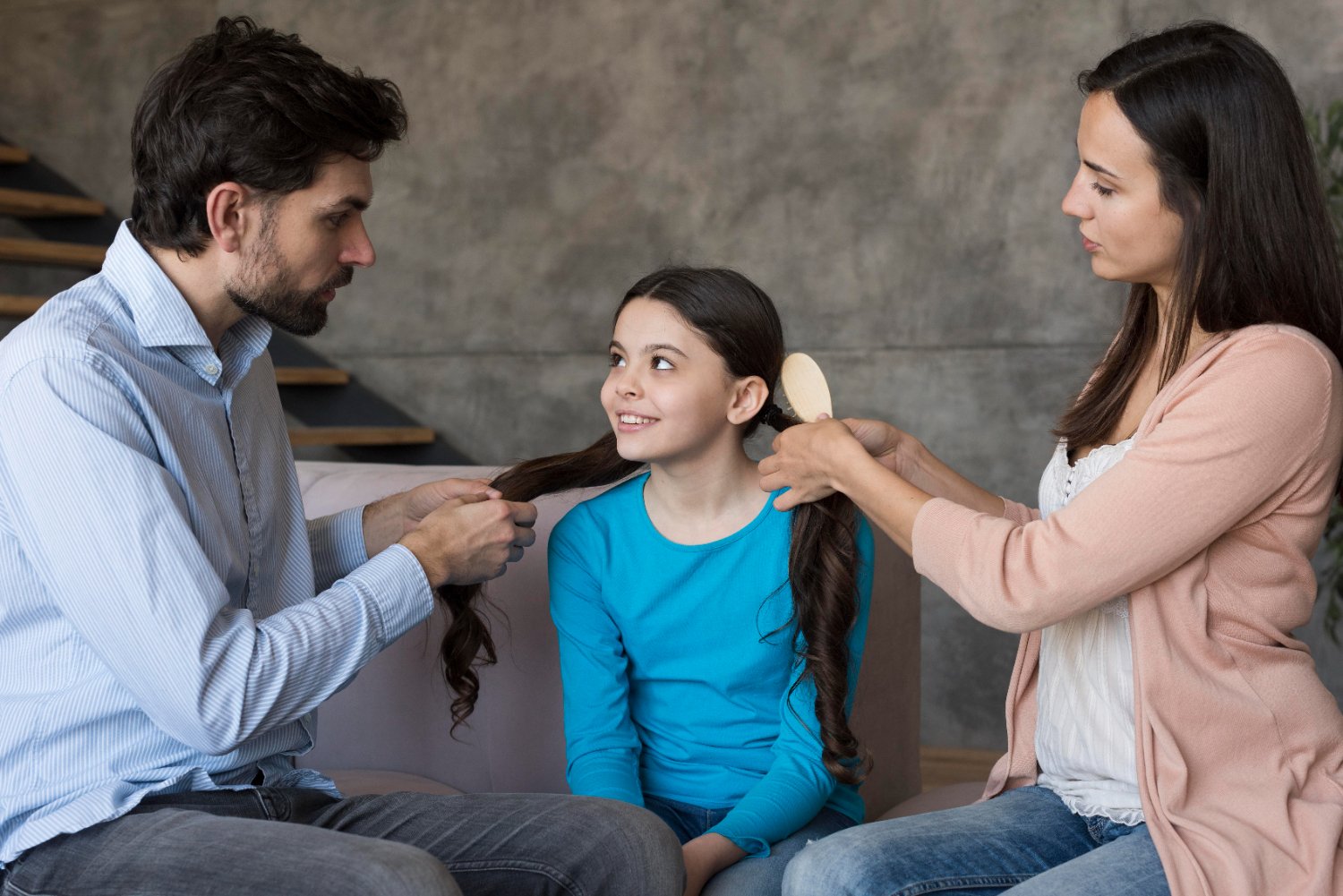Positive Parenting and Family Mental Health Guidance in Udaipur
Parenting is a process of nurturing, protecting, and guiding a child to help them develop and become independent.
At Child Guidance, Parenting & Counselling Clinic (CGC), Udaipur, our doctors have an expertise in handling complexities related to parent-child relations and family psychopathology. Our psychiatrists and psychologists treat and deliver interventions are broad spectrum covering the child, parent, family, grandparents and other social networks (school, college and peer circle). Our mental health doctors aim on overall care of the child/teenager, so that the benefits of good mental health can be seen across all areas of one’s life.


The Impact of Parenting & Family mental health
Research suggests that parenting styles can have a range of short and long lasting effects on children/teenagers. Some areas of a child’s life that may be affected, whether in the present or the future, include:
- Academics: Parenting styles can play a part in academic achievement and motivation.
- Mental health: Parenting styles can also influence children’s mental well-being. Kids raised by authoritarian, permissive, or uninvolved parents tend to experience more anxiety, depression, and other mental health problems.
- Self-esteem: Kids raised by parents with an authoritative style tend to have stronger self-esteem than kids raised by parents with other styles.
- Social relationships: Parenting styles can impact how kids relate to other people. For example, kids raised by permissive parents are more likely to be bullied, while kids raised by authoritarian parents are more likely to bully others.
- Adult relationships: Researchers have also found that kids raised by strict, authoritarian parents may be more likely to experience emotional abuse in adult romantic relationships.
Learning about parenting styles.
Parenting styles can have a significant impact on children’s development, and some styles are considered more effective than others. These include healthy styles and unhealthy styles.
- Authoritative
- Authoritarian
- Indulgent or permissive
- Neglectful or uninvolved
- Child-centered
- Positive
- Narcissistic
- Nurturant-Responsive

Authoritative style is the best for all children
This style is considered the most recommended parenting style. Authoritative parents are warm and supportive, but also set clear boundaries and expectations. They use positive discipline to teach values and independence, and encourage open and honest discussions. Children with authoritative parents tend to be self-disciplined and can think for themselves.
Some key aspects of parenting
Providing a nurturing environment: Parents are the primary caregivers for a child’s nutrition, stimulation, and protection, which are essential for healthy brain development.
Spending quality time: Parents should spend quality time with their children, including playing with them.
- Understanding developmental milestones and age related issues of child: Parents should be aware of developmental milestones and norms to keep their children safe and healthy.
- Understanding the role of professionals (child psychologists and psychiatrists, counsellors, school psychologists ): Parents should understand the role of professionals like educators, health care providers, and social workers who can support parenting.
- Being aware of social systems & cultural differences: Parents should be aware of social systems like cultural issues, religion, laws, policies, and institutions that can support parenting.
Parental mental health matters for child’s mental health
Many parents with mental health problems are able to give their children safe and loving care, without their children being negatively affected in any way. But sometimes, parents with mental health problems need support from family members, friends, neighbours and/or professionals, to help them care for their children.
At Child Guidance, Parenting & Counselling Clinic (CGC), Udaipur, our doctors have address this fact wholeheartedly.
We’re using the term ‘parental mental health problems’ to mean that a parent or carer has a diagnosable mental health condition. We’re including mental health problems experienced during pregnancy and following birth, referred to as ‘perinatal mental health problems’.
Conditions parents might experience include:
- depression
- anxiety disorders
- schizophrenia
- bipolar disorder
- personality disorders.
Mental health problems can vary in severity and impact differently on people’s day to day lives. This depends on parents’ individual circumstances and the support they receive. Parental mental health problems might occur alongside other stressful life experiences.
Challenges may arise as a result of the condition, contribute to the condition developing, or make it worse. For example, if a parent is experiencing financial problems, this can negatively affect their mental health. And if the parent becomes unable to work due to their mental health, this can exacerbate their financial problems. Coping with lots of challenges at once can make it difficult for parents to provide their children with the care that they need. Helping parents heal and do well is as important as is treating their children At Child Guidance, Parenting & Counselling Clinic (CGC), Udaipur.
Nine child-rearing tips can help you feel more fulfilled as a parent.
1. Boost Your Child’s/teenagers Self-Esteem
Kids start developing their sense of self as babies when they see themselves through their parents’ eyes. Your tone of voice, your body language, and your every expression are absorbed by your kids. Your words and actions as a parent affect their developing self esteem more than anything else.
Choose your words carefully and be compassionate. Let your kids know that everyone makes mistakes and that you still love them, even when you don’t love their behavior.
2. Catch Kids / teens Being Good
The more effective approach is to catch kids doing something right: “You made your bed without being asked — that’s terrific!” or “I was watching you play with your sister and you were very patient.” These statements will do more to encourage good behavior over the long run than repeated scoldings.
3. Set Limits and Be Consistent With Your Discipline
Discipline is necessary in every household. The goal of discipline is to help kids choose acceptable behaviors and learn self-control. They may test the limits you establish for them, but they need those limits to grow into responsible adults.
4. Make Time for Your Kids/ teenagers on daily basis
Many parents find it rewarding to schedule together time with their kids. Create a “special night” each week to be together and let your kids help decide how to spend the time. Look for other ways to connect — put a note or something special in your kid’s lunchbox.
Teens seem to need less undivided attention from their parents than younger kids. Because there are fewer windows of opportunity for parents and teens to get together, parents should do their best to be available when their teen does express a desire to talk or participate in family activities. Attending concerts, games, and other events with your teen communicates caring and lets you get to know more about your child and his or her friends in important ways.
Don’t feel guilty if you’re a working parent. It is the many little things you do — making popcorn, playing cards, window shopping — that kids will remember.
5. Be a Good Role Model
Young kids learn a lot about how to act by watching their parents. The younger they are, the more cues they take from you. Before you lash out or blow your top in front of your child, think about this: Is that how you want your child to behave when angry? Be aware that you’re constantly being watched by your kids. Studies have shown that children who hit usually have a role model for aggression at home.
Model the traits you wish to see in your kids: respect, friendliness, honesty, kindness, tolerance. Exhibit unselfish behavior. Do things for other people without expecting a reward. Express thanks and offer compliments. Above all, treat your kids the way you expect other people to treat you.
6. Make Communication and clarification a Priority
All children /teens want and deserve explanations as much as adults do. If we don’t take time to explain, kids will begin to wonder about our values and motives and whether they have any basis. Parents who reason with their kids allow them to understand and learn in a non-judgmental way.
Make your expectations clear. If there is a problem, describe it, express your feelings, and invite your child to work on a solution with you. Be sure to include consequences. Make suggestions and offer choices. Be open to your child’s suggestions as well. Negotiate. Kids who participate in decisions are more motivated to carry them out.
7. Be Flexible and Willing to Adjust Your Parenting Style
Kids & teenagers’ environments have an effect on their behavior, so you might be able to change that behavior by changing the environment. If you find yourself constantly saying “no” to your 2-year-old, look for ways to alter your surroundings so that fewer things are off-limits. This will cause less frustration for both of you.
As your child changes, you’ll gradually have to change your parenting style. Chances are, what works with your child now won’t work as well in a year or two.
Teens tend to look less to their parents and more to their peers for role models. But continue to provide guidance, encouragement, and appropriate discipline while allowing your teen to earn more independence. And seize every available moment to make a connection!
8. Show That Your Love Is Unconditional and live up to it in actions and behaviors as well.
As a parent, you’re responsible for correcting and guiding your kids. But how you express your corrective guidance makes all the difference in how a child receives it.
9. Know Your Own Needs and Limitations as a Parent
There is nothing as such as perfect parents or prefect children. You have strengths and weaknesses as a family leader. Recognize your abilities — “I am loving and dedicated.” Vow to work on your weaknesses — “I need to be more consistent with discipline.” Try to have realistic expectations for yourself, your partner, and your kids. You don’t have to have all the answers — be forgiving of yourself.
And try to make parenting a manageable job. Focus on the areas that need the most attention rather than trying to address everything all at once. Admit it when you’re burned out. Take time out from parenting to do things that will make you happy.
Focusing on your physical , mental, psychosocial needs does not make you selfish. It simply means you care about your own well-being, which is another important value to model for your children.

Family mental health & Wellness
Family Mental Health is a crucial aspect of overall well-being, as the dynamics within a family unit can significantly impact the mental health of each member.
Understanding the connection between family interactions and mental well-being is essential for fostering a supportive and healthy environment. At CGC Udaipur, we look at the various factors that influence family mental health, including the impact of family dynamics, strategies for recognizing signs of mental health issues, and ways to support family members facing challenges. By promoting open communication, setting healthy boundaries, and seeking professional help when needed, families can nurture resilience and well-being within their unit.
Our posts






Parenting videos and Informative by Dr. Ansha Patel
What Our Patients are Saying
“
The doctor is very supportive and kind. She helped me alot to recover from PTSD and without her I cannot be able to recover. I am under treatment and I feel the recovery and learnt how to control my anxiety.
”Adhoksha Joshi
2 year ago“
This is great experience for me.....
These things makes us knowledge more knowledgeable how we have lifestyle and how to
maintain our life in current situation's.......
Shilpi Bharadwaj
a year agoFurther references
1. Parents & Families . Retrieved from : https://www.childrensmentalhealthmatters.org/find-help/parents-families/
2. Parenting and mental health . Retrieved from : https://my.clevelandclinic.org/hhttps://www.mentalhealth.org.uk/explore-mental-health/a-z-topics/parenting-and-mental-healthealth/diseases/4152-eating-disorders
3. Parental mental health problems . Retrieved from : https://learning.nspcc.org.uk/children-and-families-at-risk/parental-mental-health-problems#:~:text=Parental%20mental%20health%20problems%20might,negatively%20affect%20their%20mental%20health.
Book With Us Now
Get an Appointment
Support your child’s development—book your appointment today for expert guidance!
